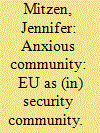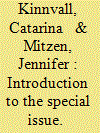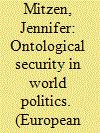|
|
|
Sort Order |
|
|
|
Items / Page
|
|
|
|
|
|
|
| Srl | Item |
| 1 |
ID:
160621


|
|
|
|
|
| Summary/Abstract |
From the Eurocrisis to the migration crisis, and from Brexit to a strengthening far right, the European Union (EU) faces multiple stressors. But while crises unleash anxiety, they do not necessarily portend the worst: because they disrupt old routines, crises can open space for new political possibilities. As a self-consciously hybrid, ‘post-national’ political form, the EU would seem poised to take advantage. Instead it is stuck. In this paper, taking an ontological security approach and focusing on EU migration governance, I propose that one cause of paralysis could lie – ironically – in an aspect of the EU that is crucial to its normative power: Europe’s long peace. An ontological security perspective highlights the management of existential anxiety as crucial to identity, suggesting how different modes of anxiety management have different political effects. Applied here, EU narratives and routines preserving ‘no war’ might suppress relations of structural power; they might mimic primitive defense mechanisms; or they might be symptoms pointing to unconscious processes keeping difficult knowledge – including colonial pasts – undealt with. I suggest how migration governance might manifest these mechanisms, contributing to the difficulties of desecuritising migration and linking its governance to EU values and institutions.
|
|
|
|
|
|
|
|
|
|
|
|
|
|
|
|
| 2 |
ID:
151174


|
|
|
|
|
| Summary/Abstract |
The research community of ontological security scholars is vibrant and wide-ranging, defined by a conceptual core and by the themes through which scholars register their disagreements. In this special issue we have collected some of the work that has been produced or inspired by discussions and meetings during the last few years. The goal is to showcase some of the breadth of insights and possibilities on the topic of ontological securities and insecurities in world politics. Thus far, International Relations scholarship on ontological securities in world politics has been varied, focusing on different referent objects (individual, society, group, state), different political outcomes (cooperation, conflict, violence; stability or change) and different methods (quantitative, qualitative, discursive). While on the face of it such differences would seem to pose a challenge to the goal of developing a coherent research agenda, we have found the range of work and diversity among ontological security scholars to be exceptionally productive, leading already to cross-fertilisation and the deepening of our own approaches, while also inspiring new collaborations. The articles in this special issue discuss the subjective and foundational dimensions of ontological security in philosophical, existential and empirical terms and approach the ‘level-of-analysis’ problem from new perspectives.
|
|
|
|
|
|
|
|
|
|
|
|
|
|
|
|
| 3 |
ID:
073832


|
|
|
|
|
| Publication |
2006.
|
| Summary/Abstract |
This article proposes that in addition to physical security, states also seek ontological security, or security of the self. Ontological security is achieved by routinizing relationships with significant others, and actors therefore become attached to those relationships. Like its physical counterpart, the ontological security motive is a constant. But states may adhere to routines rigidly or reflexively, and variation in attachment style has implications for security-seeking. This article conceptualizes the individual-level need for ontological security, scales it up to states, and applies the ontological security-seeking assumption to the security dilemma. Realists argue that states want to escape security dilemmas but uncertainty prevents them. Ontological security-seeking suggests that states may not want to escape dilemmatic conflict. Because even dangerous routines provide ontological security, rational security-seekers could become attached to conflict. Ontological security-seeking sheds new light on seemingly irrational conflict, and suggests lines of research into the stability of other outcomes in world politics.
|
|
|
|
|
|
|
|
|
|
|
|
|
|
|
|
|
|
|
|
|